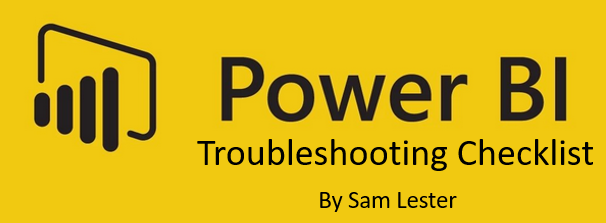Power BI Troubleshooting Checklist

If you have ever started a sentence with “I’m seeing a strange issue in my Power BI Desktop report” and wondered how to investigate, this article is for you.
Over the past few years of troubleshooting Power BI Desktop customer issues, I’ve created a checklist that often helps to identify a root cause within a couple minutes. If there are other handy tricks that you use, please share them in the comments below.
Since I work with several customers, most of the requests come via email or social media. Here are the investigation steps/questions that I use:
- What version of Power BI Desktop are you using? Does the report include custom visuals or preview features?
- Reason: With the technology improving so quickly, we encounter older reports that have been working for months, then stop working somewhat unexpectedly. These are typically a version problem, either with something that has been updated in the service causing a mismatch with Desktop components or with the existence of older custom visuals that are out of date and causing the issue.
- Are you seeing a “Send a frown” pop-up?
- Reason: If so, this is very helpful in that the diagnostics have been aggregated for quick inspection.
- Is it failing consistently? Can you reproduce it? Is it something that can be shared with me to investigate?
- Reason: Intermittent issues can be really challenging to investigate, but consistent issues are typically much easier to resolve. Also, getting access to the report makes it significantly easier to troubleshoot. This is obviously not always an option with PII, HBI data, etc., but when available makes it much quicker.
- Does it fail when someone else accesses the same report? Does it fail if you open it on a different machine?
- Reason: This is the Power BI version of the question ‘Have you tried rebooting’ to fix an IT problem. By trying it with other users and on other machines, you can narrow down if the problem is a machine issue, user issue, or something else. An extension of this question is to ask if they have tried to rebuild the model from scratch in another instantiation of Power BI Desktop (recreate the report).
- Are you using preview features?
- Reason: Preview features are available to use and explore, with the disclaimer that they might be removed in future versions. I have had a couple issues with crashing Power BI Desktop when using preview features, but typically I haven’t seen many issues in this category.
- Can you enable diagnostics prior to reproducing the issue and check the logs for any error messages?
- Reason: In the Options menu under the Diagnostics pane, you can enable tracing. The log is quite verbose and helpful. The log is stored under %UserProfile%\Microsoft\Power BI Desktop Store App\Traces. Tracing has identified several issues for me where the other techniques did not reveal any hints.
The previous questions assume that the file can be opened. However, I’ve seen several situations where the .pbix file would not open. In this case, my suggestion is to create a copy of the file, rename the extension to .zip, and unzip the contents. Gilbert Quevauvilliers wrote a great blog exploring these contents to see what is included in the unzipped .pbix file. By unpacking the contents of the .pbix file, I’ve discovered issues where email filters stripped out critical portions of the file and when environment settings prevented the file from being opened. This can also be used to find the versions of the custom visuals included in the report by opening the JSON file under ‘\Report\CustomVisualizations’. If the custom visual has been updated with a newer release, try replacing the existing visual with the updated visual. This has also solved many customer issues.
While this is certainly not an exhaustive list, this set of troubleshooting steps has helped me (and now many of my customers and colleagues) get to the root cause of an issue in Power BI. Often, they can be fixed with updating versions, checking the diagnostic logs, or investigating the unpacked contents. In some cases, we’ve ended up with issues that I’ve taken back to the product team that have now been fixed in the current version.
If you have additional troubleshooting tips and tricks, please share them in the comments.
Thanks,
Sam Lester (MSFT)
Comments
- Anonymous
March 15, 2018
Thank You, Samuel Lester. This checklist is really helpful